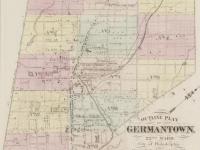Answer: Francis Daniel Pastorius
This week marks the 150th anniversary of Juneteenth, a celebration that commemorates the emancipation of the enslaved peoples of Texas on June 19, 1865. Over a century and a half before this remarkable event, a few of Philadelphia's Quakers in the city's Germantown neighborhood set forth on a path to abolish slavery. Early in 1688, at the home of one Thönes Kunders, four practicing Quakers, Derick op den Graeff, Abraham op den Graeff, Francis Daniel Pastorious, and Garret Hendericks, wrote and signed the nation's first written protest against slavery. The protest was addressed to the Quaker ministry in Dublin, Pennsylvania, and began:
These are the reasons why we are against the traffik of men-body, as followeth: Is there any that would be done or handled at this manner? viz., to be sold or made a slave for all the time of his life? How fearful & fainthearted are many on sea when they see a strange vassel. being afraid it should be a Turck, and they should be tacken, and sold for slaves into Turckey. Now what is this better done, as Turcks doe? yea, rather is it worse for them wch say they are Christians, for we hear that ye most part of such negers are brought heither against their will & consent and that many of them are stollen. Now tho they are black, we can not conceive there is more liberty to have them slaves, as it is to have other white ones. There is a saying that we shall doe to all men licke as we will be done ourselves; macking no difference of what generation, descent or Colour they are.
(Partial transcription taken from a transcription of the original protest provided by Haverford College through the digital library of the Haverford College Quaker and Special Collections & Friends Historical Library of Swarthmore College. A transcribed and printed copy of the protest can be found in HSP's broadside collection, call number Ab n.d. 149.)

